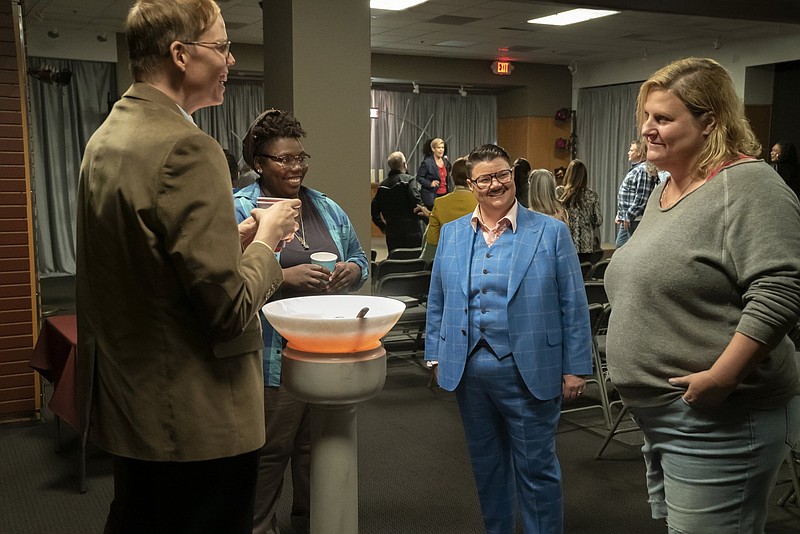Sam Miller, a 40-something ex-bartender who moved back to her hometown a year ago, sleeps on the couch in the small house where she lives alone. Other than an old truck and a rotation of oversize gray T-shirts, she doesn't have much; even the faint shimmer of a potential romance with a handsome neighbor evaporates with a hilariously bleak abruptness.
Her Saturdays are dedicated to the primal pleasure of drinking wine in her underwear. Family crises that some might view as a call to action mostly just enervate her: She doesn't need another reminder that middle age can be overwhelmingly hard and ponderously boring.
In another era of entertainment, HBO's "Somebody Somewhere" would've been a Sundance movie, another muted indie named after a bygone song starring a comedian in a dramatic turn. Here, that comedian is Bridget Everett, the New York-based alt-cabaret vocalist, who brings a slice of her Manhattan to the show's Manhattan, the real-life Kansas college town where Everett's father served as mayor, as did her brother years later.
What a relief "Somebody Somewhere" isn't a 90-minute film, though. The draw of a warm and moving drama like this is experiencing the texture of Sam's environs and the meaningful moments between the characters, and the seven half-hour episodes give the story room to breathe and unfurl at its own leisurely pace.
Character actor Jeff Hiller and drag king Murray Hill play two of the gay outsiders among whom Everett's Sam eventually finds a community — and quietly steal all their scenes. Through a weekly LGBTQ-friendly variety show, Sam discovers that there was always a place for her at home. This would be the place to make a "Wizard of Oz" joke, except the show is self-aware enough to get there first.
Storywise, there are few surprises. Sam, sleepwalking through the mourning period after her sister Holly's death as a professional essay-grader for a College Board-like company, is convinced that the window for making life happen has passed her by. A friendly co-worker, Joel (Hiller), who harbors something of a platonic crush on Sam from their days in high school show choir, encourages her to get back into singing, ideally at what he calls church choir practice, which isn't exactly that. Through her new friendship with Joel, Sam realizes that she can find happiness in what locals call the Little Apple.
The pressures of heteronormativity and feminine self-whittling — and Sam's mini-rebellions against them — are portrayed with particular care and subtlety throughout the season: Sam's contempt for her more conservative sister Tricia's (Mary Catherine Garrison) gift shop full of "knickknacks and doodads"; Tricia's freakout when Sam dyes her daughter Shannon's (Kailey Albus) hair blue and gives the teen a lesbian-theme T-shirt that had belonged to Holly; a passing comment from Tricia's thin, unhappily married business partner Charity (Heidi Johanningmeier) that the heavier Sam find a gym. The thoughtful background design choices offer many a silent hint as to who exactly these women are. Tricia's store displays a large but tasteful wooden cross, and her kitchen contains one of those Instagram-friendly, motivational water bottles encouraging weight loss by drinking a gallon of water a day with hourly consumption goals.
As a protagonist, Sam is mostly an existential corpse awaiting resurrection, but Everett brings out the spiky sarcasm that probably made her character a young misfit in her small town, as well as the resigned hopelessness that has convinced her that happiness can only be found elsewhere. It did make me miss the sensual yet world-weary energy of Everett's supporting role in the underrated Sundance crowd-pleaser "Patti Cake$," in which she played a disillusioned former singer and the struggling single mother of a teenage daughter determined to pursue a rap career. Here, Everett's turn is unflashy, with the production's hushed naturalism — most conspicuous in the tone and casting — extending to her musical segments. But it's also a generous performance, helping to gel an ensemble with a wide range in screen experience.
The preponderance of narratives in pop culture about young outcasts finding near-utopias and chosen families in the big city makes a show like this one about middle-aged, unglamorous LGBTQ townies stand out all the more. Joel and his choir buddy Fred (Hill), a professor at the local agriculture college, aren't incurious about the larger world the way Tricia is. But they've also figured out how to carve out a space for themselves in the semirural Midwest as neighbors, employees, congregants and, my favorite role, volunteers praying for pets.
Joel's story line gradually reveals itself as a fascinating inverse of Sam's: that of a chronic belonger who comes to realize he doesn't need as much community, or the approval of others, as he'd thought. Through each other, Sam and Joel discover they can finally stop searching for something they've already got.
